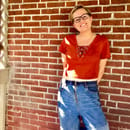Throughout high school, I talked about sex and masturbation with my friends, but we rarely talked about the actual mechanics of how to have an orgasm as a woman. Instead, we were taught through movies, books, and TV shows that during sex, waves of pleasure simply washed over women without any thought or action on the woman’s part. In response, we learn that we must fake an orgasm when having sex because we believe that it is the only way to please our partners. All in all, growing up, we focused our thoughts on these patterns of behavior as what sex and orgasms should be for women; no attention was ever paid to the idea that sometimes, orgasms don’t come, or sometimes they can be difficult to achieve.
In 2018, an article reported that between 10% and 40% of women have difficulty reaching an orgasm or are unable to orgasm. While many different factors can play a role in whether or not a woman has an orgasm, the overall percentage of women who have difficulty orgasming is shockingly high and goes to show that while we might be led to think that orgasms are easily attainable for all women. This is far from the truth.
Thankfully, OMGYes was made to help put an end to these misconceptions and help women orgasm. The internet site was created by Lydia Daniller and Rob Perkins, two friends who saw a lack of information on the subject of female sexuality and orgasms and sought out a solution. The physical online platform is currently made up of two “seasons,” with a third one on the way.
The first season, which costs a one-time payment of $49, includes 12 in-depth techniques entitled, edging, rhythm, hinting, consistency, surprise, multiples, accenting, framing, layering, staging, orbiting, signaling, and within all of these sections, there are a total of 62 short videos and 11 “touchable” videos. The videos include women’s testimonies about a certain orgasm technique as well as videos of women using these techniques on themselves, in order to give a visual demonstration to go along with the verbal and written descriptions. The “touchable” videos are interactive videos where people can test out a method before taking it into their sex lives. The second season, which costs another one-time payment of $49, is basically the same format as the first, but there are 13 new sections with completely different content.
In order to gather all of the information found on OMGYes, researchers conducted more than 1,000 interviews with women ranging in age from 18 to 95 years old. Each participant was unique in that she did not have the same sexual experience as the one before her. However, the researchers did find patterns within the techniques used and issues encountered by the interviewees, thus forming the categories in the seasons.
The use of testimonies from a wide range of sources with different lives and different identities speaks to the universality of this site. With half of its users female, and the other half male, OMGYes serves to education everyone on the topic of female sexuality, pleasure, and orgasms, as it can be used in many ways, such as by a woman looking to learn about her own body or by a couple of any sexuality looking to improve their sex through the tools on OMGYes.
Sex is complicated. There are very few parts of sex that are straight forward, and a lot of the time, people have no idea what they are doing, especially when it comes to female orgasms. That’s why a site like OMGYes is so crucial in helping to educate everyone on female sexuality, a topic that is oftentimes pushed aside in conversation. It is a place of sanctuary for women who feel like they are broken because they cannot orgasm. It is a place of adventure for couples looking to spice up their sex life. It is a place of exploration for anyone curious about healthy female sexuality.


